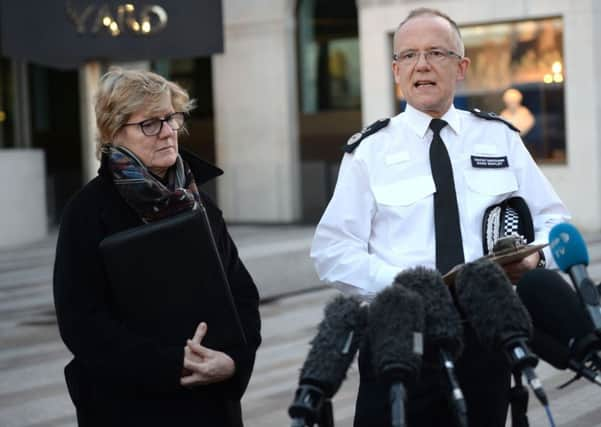Record 412 terrorism-related arrests made in UK last year


The number of arrests made in 2017 was an increase of 58 per cent compared with 261 the previous year.
It was the first time the tally for a calendar year has been above 300 arrests.
Advertisement
Hide AdAdvertisement
Hide AdA Home Office bulletin said the increase was partly due to a large number of arrests after attacks in London and Manchester.
The vast majority of the arrests last year were linked to either international or domestic terrorism, which were both at the highest level on record.
Three hundred of the arrests were in the international category, which covers suspected activity linked to or motivated by terrorist groups based outside the UK such as Islamic State.
Seventy-one of the arrests were logged in the domestic bracket, which relates to cases where there is no connection to either Northern Ireland related or international terrorism.
Further breakdowns are not given in the statistics, but it is thought the rise in “domestic” arrests mainly reflects an increasing focus on suspected extreme right-wing activity.
Of the arrests made over the year, 135 resulted in a charge, of which 110 were charged with terrorism-related offences, 228 individuals were released without charge, 33 were released on bail pending further investigation, 13 faced “alternative action” and three cases were pending.
The statistics also showed:
- The number of white suspects arrested (145) was the highest since data collection started in 2001, while 170 individuals of Asian ethnicity were arrested, a 37 per cent increase on 2016;
- Sixty-one females were arrested - the largest number for any calendar year;
Advertisement
Hide AdAdvertisement
Hide Ad- Arrests of those aged under 18 reached record levels, with 27 last year;
- The proportion of suspects considering themselves to be of British or British dual nationality (68 per cent) was the lowest in a calendar year since 2011;
- As of the end of last year, 224 prisoners were in custody after being charged with or convicted of terrorism-related offences;
- The Metropolitan Police Service carried out 767 stop and searches under the Terrorism Act - an increase of 59 per cent on the previous year.
Security chiefs have described the scale of the threat being confronted as unprecedented.
Police and MI5 are running more than 600 live counter-terror investigations relating to 3,000 individuals.
There is also a wider pool of 20,000 former “subjects of interest” who have previously featured in probes and who are kept under review.
Britain was hit by five attacks last year, while counter-terror agencies made an unprecedented number of interventions to thwart suspected attack planning.
Advertisement
Hide AdAdvertisement
Hide AdPolice say 10 Islamist and four extreme right-wing plots have been stopped since the Westminster atrocity in March last year.
Security minister Ben Wallace said: “Today’s figures are, once again, testament to the breadth of work undertaken by the police, security service and wider judicial system in identifying and stopping terrorism in our communities and bringing those responsible to justice.
“The police and security service have been clear about the scale of the threat we face.
“We will continue to work with them and other agencies to ensure we have a broad response to all forms of terrorism both now and in the future.
“The public should remain alert but not alarmed and report any suspicions they have about unusual activity or behaviour to the appropriate authorities.”